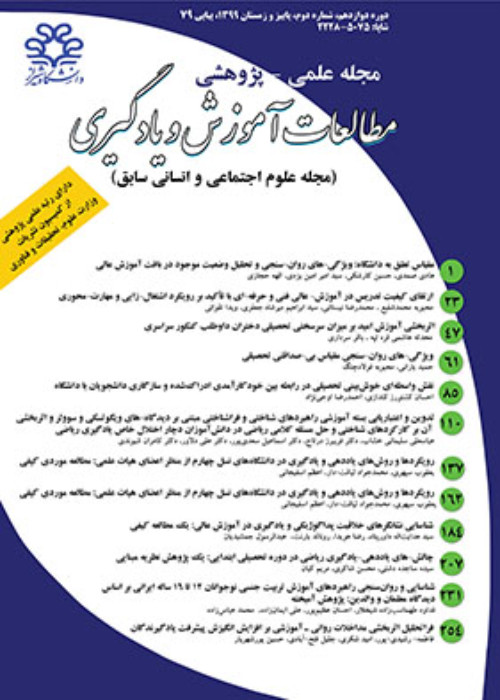A Pathology of the Learning Culture in the Students of Humanities
Author(s):
Article Type:
Research/Original Article (دارای رتبه معتبر)
Abstract:
Introduction
Human beings can achieve their goals when they have the right function in their educational programs, and have a scientific and precise plan, providing the students with a better level of learning. The quality of teaching and learning in the university depends on the capabilities of the learning culture. Since human beings, because of the nature of the knowledge of the other disciplines, have certain cultural aspects, it is necessary to research the status of the learning culture of students in these disciplines. According to the literature, the factors and elements of the learning culture of students are distinct, but so far, research has not been done to study the learning culture of the students of humanities in Iran. Therefore, this research was conducted as a pathology of learning culture of these students.Research Questions
The questions of study were those appearing in Survey weakness of Human sciences students learning culture.
Methods
This was an applied qualitative case study. In this study, semi-structured interviews were conducted with 14 members of the faculty and educational administrators and 18 students of Human sciences. Content analysis was used to analyze and categorize the results of interviews and because the interviews were based on the conceptual framework derived from literature review, the deductive method (top-down) was used in content analysis and categorization of qualitative data.Results
Categories obtained were classified and presented in accordance with the framework of a learning culture at the interactional, individual, and institutional levels. The individual level included factors pertaining to the motivation to learn, the role of the learner, student's expectations of learning, learner tasks. The institutional level considered the appreciation and encouragement of educational innovation, formal and informal rules, improving the quality of the learning context, faculty development, and enhancing the training capacity. The interactive level encompassed issues related to the learning space, content and knowledge structure, goals, media, evaluation of teacher relations with students, faculty, and time frame.Discussion and
Conclusion
Improving student learning culture represents a valid and valuable educational activity of the humanities educational groups and it can affect the quality of their performance. The results of research is insightful for expanding effective learning in the students of humanities.Keywords:
Language:
Persian
Published:
Studies in Learning & Instruction, Volume:10 Issue: 1, 2018
Pages:
131 to 167
magiran.com/p1879789
دانلود و مطالعه متن این مقاله با یکی از روشهای زیر امکان پذیر است:
اشتراک شخصی
با عضویت و پرداخت آنلاین حق اشتراک یکساله به مبلغ 1,390,000ريال میتوانید 70 عنوان مطلب دانلود کنید!
اشتراک سازمانی
به کتابخانه دانشگاه یا محل کار خود پیشنهاد کنید تا اشتراک سازمانی این پایگاه را برای دسترسی نامحدود همه کاربران به متن مطالب تهیه نمایند!
توجه!
- حق عضویت دریافتی صرف حمایت از نشریات عضو و نگهداری، تکمیل و توسعه مگیران میشود.
- پرداخت حق اشتراک و دانلود مقالات اجازه بازنشر آن در سایر رسانههای چاپی و دیجیتال را به کاربر نمیدهد.
In order to view content subscription is required
Personal subscription
Subscribe magiran.com for 70 € euros via PayPal and download 70 articles during a year.
Organization subscription
Please contact us to subscribe your university or library for unlimited access!


